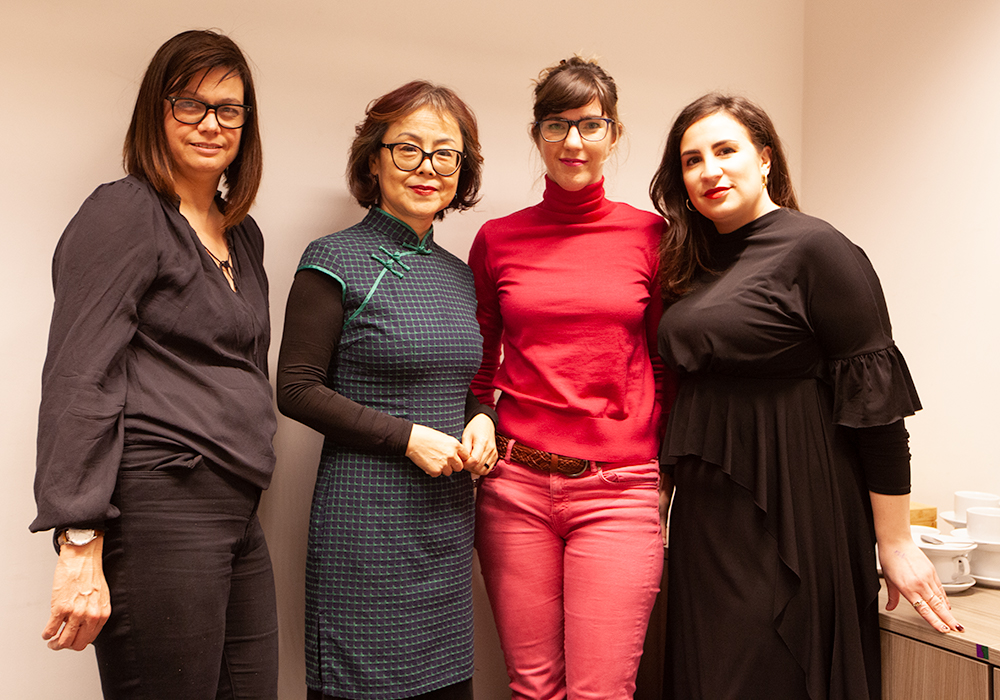[vc_row][vc_column][vc_single_image image=”104667″ img_size=”full” add_caption=”yes”][vc_column_text]“I found it empowering to be told I couldn’t talk about something,” said Gabby Edlin, founder of Bloody Good Period, on the stigmatisation of periods at the launch of the winter 2018 edition of Index on Censorship magazine.
The issue, on the theme of birth, marriage and death, investigates what we are afraid to talk about and why. Whether it’s contraception misconceptions in Latin America, prejudice against interracial marriages in South Africa, or genocides around the world, a plethora of countries and topics were featured in this special report.
Taking place at Foyles’ flagship store in Charing Cross, London, which was once the world’s largest bookshop, Edlin was joined by award-winning author Emilie Pine, author of Notes to Self, and Xinran, the internationally best-selling author of The Good Women of China who also introduced the first women’s call-in radio show in China. The panel was chaired by Rachael Jolley, editor of Index on Censorship magazine.
Edlin raised the taboo of period poverty, highlighting an unsettling scene in the Bafta-winning film I, Daniel Blake, in which a woman is caught stealing sanitary products and propositioned sex by a security guard in return for her freedom.
She said: “That was the moment that a lot of people woke up to the idea that, of course, women can’t afford this if they can’t afford everything else. But, everyone has experienced not having the product when you need it. It’s absolutely universal, it’s not just women living in poverty, it’s not just asylum seekers. Every single woman who has menstruated knows what it’s like to go without.”[/vc_column_text][vc_row_inner][vc_column_inner width=”1/3″][vc_single_image image=”104670″ img_size=”full” add_caption=”yes”][/vc_column_inner][vc_column_inner width=”1/3″][vc_single_image image=”104668″ img_size=”full” add_caption=”yes”][/vc_column_inner][vc_column_inner width=”1/3″][vc_single_image image=”104669″ img_size=”full” add_caption=”yes”][/vc_column_inner][/vc_row_inner][vc_column_text]Xinran explained the pain of the controversial one-child policy in China: “Countryside women came to the city and realised girls have equal rights but in the countryside, the mother had to kill their daughters or give them away. Still now no-one talks about it.”
However, family policy is changing. “The Chinese published a new stamp because this year is a pig year – with a parent with three babies – that is a signal to a parent that it’s not one child, not two children, it is free now.”
“We think that we are now such an open, liberal society and you can say anything you want on Twitter, but actually we’re still very, very closed and we talk about things without really talking about them,” said Pine, whose Notes to Self breaks down the taboo of miscarriages and sexual violence.
“This woman, who I had never met before, came up to me and said, ‘I had a miscarriage two months ago and nobody knows’, and then just walked away. She walked away I think from having said it as well and from the need to say it. We need to tell our stories.”
For more information on the winter issue, click here. Find out why we find it impossible to talk about birth, death and marriage, according to Rachael Jolley. The winter podcast is also available on iTunes and SoundCloud.[/vc_column_text][vc_basic_grid post_type=”post” max_items=”4″ element_width=”6″ grid_id=”vc_gid:1547210035015-71572e6c-f63e-3″ taxonomies=”8957″][/vc_column][/vc_row]













